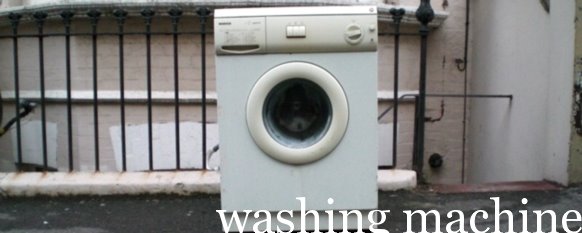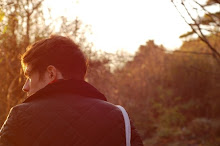 though TV schedules this year haven't been this drab since the wartime hiatus imposed on all VH frequencies in 1939, there was one programme that made it worth pointing all your furniture at the dusty box in the corner. it was Stewart Lee's Comedy Vehicle. probably the hardest working stand-up comedian still touring, Stewart Lee's solo television debut was an all-round success - not only from a critical and viewing figure stance, but a creative one too. those who have been keeping up with his almost 30-year career will know that none of his trademark "deadpan but angry" delivery was toned down for a mainstream audience. not only an accomplished comedian, he's also a (you might say struggling) writer and director - his most famous co-creation being the critically acclaimed but controversially "blasphemous" Jerry Springer: The Opera.
though TV schedules this year haven't been this drab since the wartime hiatus imposed on all VH frequencies in 1939, there was one programme that made it worth pointing all your furniture at the dusty box in the corner. it was Stewart Lee's Comedy Vehicle. probably the hardest working stand-up comedian still touring, Stewart Lee's solo television debut was an all-round success - not only from a critical and viewing figure stance, but a creative one too. those who have been keeping up with his almost 30-year career will know that none of his trademark "deadpan but angry" delivery was toned down for a mainstream audience. not only an accomplished comedian, he's also a (you might say struggling) writer and director - his most famous co-creation being the critically acclaimed but controversially "blasphemous" Jerry Springer: The Opera.he's now back on the circuit with a show (titled If You Prefer a Milder Comedian, Please Ask for One - more on that later) that's starting tonight (August 6th) at The Stand in Edinburgh. so being in a mini-celebratory mood over more new material, i exchanged internet letters with Stew to ask about the TV shows, his novels, Richard Herring, his favourite records, and just to see if he was alright.
First of all, congratulations on a highly successful first series of Stewart Lee's Comedy Vehicle. On top of the viewing figures, I heard the day after it aired it was the most watched show on BBC iPlayer. Apart from Eastenders. But no one can topple Eastenders. How successful was the show, from your point of view?
Well, people watched it, it got good reviews, it worked in the way I wanted it to work, and I got paid. So, great really.
Any word on a second series?
Nope.
Has the TV exposure brought about any significant changes to your personal and/or professional life?
It has given me enough money to get a mortgage on a flat / house with enough rooms for us not to have our son in with us, so that will make a huge difference to my personal life. Also, I can probably afford to carry on living in London now, so that's great. Professionally, it's too early to say. I hope more people come and see me live so I make more money, but I also hope that I'm not so popular that it compromises the degree of autonomy I have enjoyed for the last decade.
Executive producer Armando Iannucci said the "Religion" episode, originally lined up to be shown on 13th of April (Easter Monday), was rescheduled to the week after lest it offend any viewers. Is this true? If so, do you think it had anything to do with your track record on that particular subject?
I don't really know why they changed it. It don't know what the problem was. It was a shame as COMEDY really was meant to be 6 - there was a kind of theoretical through-line to the series about how and why and what stand-up is which the rescheduling sort of messed up. That said, the BBC is under attack at present from all corners and one has no wish to add to its woes.
The Comedy Vehicle show has had a bit of a laboured history, which was well documented on the 41st Best Stand Up Ever! Show, culminating in a comedic onstage (or offstage, rather) "breakdown". But how much of that breakdown was genuine frustration at the TV industry?
It was all genuine. It is a Kafkaesque nightmare. I can't believe the show got on and survived intact. Everyone did a marvellous job.
The "red button" segments with Armando Iannucci were as hilarious as the show itself, in my opinion. How did those develop? Was it just you and Armando trying to make each other laugh, or was there more to it?
Armando came in and asked me questions, which I didn't know anything about, for about 4 hrs, of which about 1 1/2 hrs was used. There was no real discussion before hand, but I had requested to be treated in quite a hostile way. I had no idea they would come out as well as they did. I am very happy.
I noticed Chris Morris was credited as a script editor for the series. Beyond the literal meaning of "editing the script", what was Morris' input on the show? What's he like to work with?
CM was very good on making sure everything in the sketches made sense. His input, for example, on the Samuel Beckett one, made it accessible to all rather than wank. He talked through the themes of all the episodes with me at length, and tried to help me focus on the ideas. He was very good and very inspiring to listen to.
On the subject of Morris and Iannucci, one of your first projects with Richard Herring was writing for Radio 4's On The Hour - when the show made the jump to television in the form of The Day Today, why were you and Richard not on board for that?
We were offered a big commission to write 10 mins or so a week for the TV show, but we and our manager Jon Thoday felt we had co-created some of the characters and should have got a format share of the show. In retrospect, having been on the other end of this, we were in no way responsible for the format, though I do still find it galling that Patrick Marber somehow managed so emerge with shares in Alan Partridge, which we were the initial writers for. But then it was all down to Steve's voice, I suppose, anyway. Bridge, water etc.
Your last proper collaboration with Herring was the This Morning with Richard Not Judy show, broadcast live on Sunday mornings. Was that not a bizarre time to be transferring the characters you'd perfected during stand up gigs at night to? How did your comedy body clock cope?
It was very tiring and confusing. Nothing in the show had been perfected in late night stand-up gigs though, apart from some of my lines, as Rich never did stand-up then, and we didn't perform together apart from little tours.
Why did the Lee and Herring double act come to an end? Are you still good friends?
We are still friends. The double act came to an end because anything we made on TV we always lost touring, and no-one wanted to pay us to do anything else or develop anything else. To be honest, I wish we had stopped sooner, as Rich in particular is much better on his own, but it was fun. I am very proud of the 1st series of fist of fun. The rest I have mixed feelings about, especially FOF2.
The title for your latest show is If You Prefer A Milder Comedian, Please Ask For One. What's the story behind that?
It's from a Cafe Nero loyalty card. I had a run in about my Nero loyalty card. The show will be about that in part.
On a rather serious note, about comedians provoking controversy - I remember reading your article in the Glasgow Herald a while back in defence of Billy Connolly and the Ken Bigley comments. This was written in 2004, about a year or so before the protests and picketing took place outside tour venues for Jerry Springer - The Opera. Has your experience with hate campaigns and situations taken out of context affected your outlook on the Billy Connolly media storm in 2004 at all?
No. Only strengthened it.
You've developed somewhat of a reputation as being one of the hardest working stand up comedians. You've been "in the game" about 20-odd years - what is it about being a stand up that you love so much? And what do you hate about it?
I like the autonomy. You are responsible for everything creative. I hate the stress and the loneliness. I hate being looked at by people and judged.
What's been your favourite crowd/venue so far?
I dunno. The Classic, Auckland, New Zealand.
And where have you least enjoyed performing?
Acoustically - Underbelly’s Udderbelly tent. But generally, in Maidstone.
I saw you played a gig at Bom-Bane's cafe in Brighton on 25th of May. I go back and forth to Brighton from Scotland, and I've never been inside Bom-Bane's - but I know it's a tiny place with an official capacity of about 30. What drew you to performing there?
The man who's wife runs it asked me, and I didn't have a big new show ready yet.
You also have a distinguished career outside of the stand up comedy. Taking into account your theatre work, your novel, short stories and everything else, what aspect of all this are you most proud of?
JSTO at the National, the 90s Comedian stand-up set, directing Simon Munnery's Attention Scum, the Pea Green Boat CD, and the Comedy Vehicle TV show.
Is there another novel in the works?
I've done 20 000 words of one but no-one is interested. If you're on telly publishers want junk to flog in Tescos.
You published a "recommended listening" list to accompany your novel, The Perfect Fool. How important is music to you in terms of influencing your work, whether it's the writing or the stand up?
More so as the years go on. I like the single-mindedness of Dylan, The Fall, Howe Gelb and the risk-taking of free-jazz.
Are you a musician?
Not really. I played guitar and shouted in a band in the early 90s, and I was in Simon Munnery's Alan Parker's Urban Warriors, a parody of Crass type bands which once opened for The Lightning Seeds. I may sing a country song in the new stand-up show.
What are the other prime influences on your work? (Film, books, events?)
Music, books, devised theatre, some stand-ups. Not really TV or much film.
And finally, something lightweight to go out on - what are your all time top five favourite records?
HEX ENDUCTION HOUR - THE FALL
KIND OF BLUE - MILES DAVIS
PRARIE SCHOOL FREAKOUT - ELEVENTH DREAM DAY
HIGHWAY 61 REVISITED - BOB DYLAN
HANDFUL OF EARTH - DICK GAUGHAN

